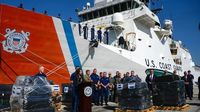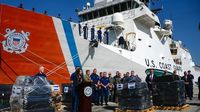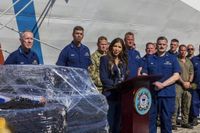FORT LAUDERDALE, Fla. (TNND) — In a significant crackdown on drug trafficking, the U.S. Coast Guard offloaded more than 45,000 pounds of illegal drugs worth $500 million at Port Everglades on Thursday, March 20, 2025. Dubbed an "unprecedented seizure," this operation highlights the government's commitment to combat the flow of illicit drugs into the United States.
The drugs were intercepted during 14 separate interdictions over the past four months off the coasts of Mexico, Central, and South America. The extensive operation involved crews from U.S. Coast Guard cutters Stone and Mohawk, as well as the Coast Guard Helicopter Interdiction Tactical Squadron (HITRON) and Tactical Law Enforcement Team-Pacific (TACLET).
In total, around 35 suspected drug traffickers were taken into custody during these operations, showcasing the effectiveness of the collaborative efforts between various federal agencies. Department of Homeland Security Secretary Kristi Noem emphasized the significance of the mission.
"This action is a testimony to President Trump’s commitment to delivering for the American people and his unwavering dedication to our military strength, border security, and law enforcement," Noem stated during a press event at Port Everglades. According to her, the seizures will lead to fewer families being torn apart by addiction and fewer lives lost to overdoses.
The successful operation comes at a time when the Coast Guard also celebrated a milestone on March 19, revealing that more than 80,000 pounds of illicit drugs have been interdicted since January 21, 2025. Adm. Kevin Lunday, acting Commandant of the Coast Guard, stated, "The Coast Guard leads the U.S. government’s efforts to control, secure, and defend the nation’s borders and maritime approaches, starting at the U.S. southern border where the president has declared a national emergency."
Recent actions indicate the unfolding strategy to leverage U.S. Navy capabilities alongside Coast Guard operations to bolster forces off California and Texas. This has become imperative as drug cartels, increasingly desperate, adapt their strategies in light of heightened border security.
"We’ve seen the cartels get much more desperate lately as the border has become more secure," Noem remarked, pointing out the complex interconnectedness of drug trafficking and migration. The commitment of federal and international partners, including 22 countries from Central and South America, highlights a comprehensive approach to tackling these issues.
Additionally, last month, Mexico transferred 29 alleged drug cartel suspects to the U.S. for prosecution, reinforcing the collaborative stance between the nations against drug trafficking. With the Coast Guard indicating that they have ramped up forces operating on the southern border since the beginning of 2025, operations such as this represent a multi-faceted approach to safeguarding American communities.
Noem highlighted that every effort is being made to prevent the trafficking of drugs like fentanyl and marijuana while ensuring that dangerous resources fall out of the hands of violent cartels.
Moreover, the statistics reveal a mixed picture in drug seizures. The Coast Guard intercepted 82,900 pounds of illegal drugs during January and February 2025, a notable decrease compared to 104,600 pounds during the same timeframe in 2024. Despite these figures, officials remain optimistic about the direction of security efforts against drug traffickers.
This ongoing operation reflects the broader commitment from the Trump administration to combat illegal immigration and drug trafficking, as stated by Noem. "We’re protecting the American people and we’re making sure cartels are not profiting from the trafficking of these drugs and preventing violence in our communities," she asserted.
With military strength, agency coordination, and international partnerships on the rise, the U.S. Coast Guard aims to send a clear message to drug cartels and smugglers: the seas belong to law enforcement, not illicit traffickers. As this operation and others unfold, the commitment to safety and security for American families remains paramount in the battle against drugs.
The effort showcases not only a robust national response to drug trafficking but also underscores the importance of unity between law enforcement agencies and international partners in the quest to combat drug-related violence and addiction crises sweeping across the nation.
As the U.S. Coast Guard continues to excel in its mission, the effects of this resurgence in naval presence will hopefully relay positive outcomes throughout communities nationwide.








